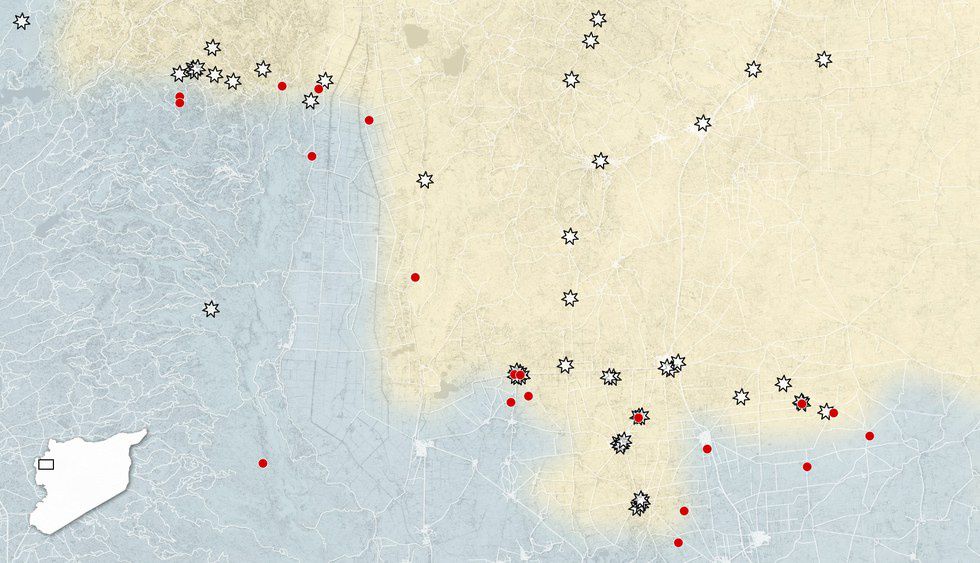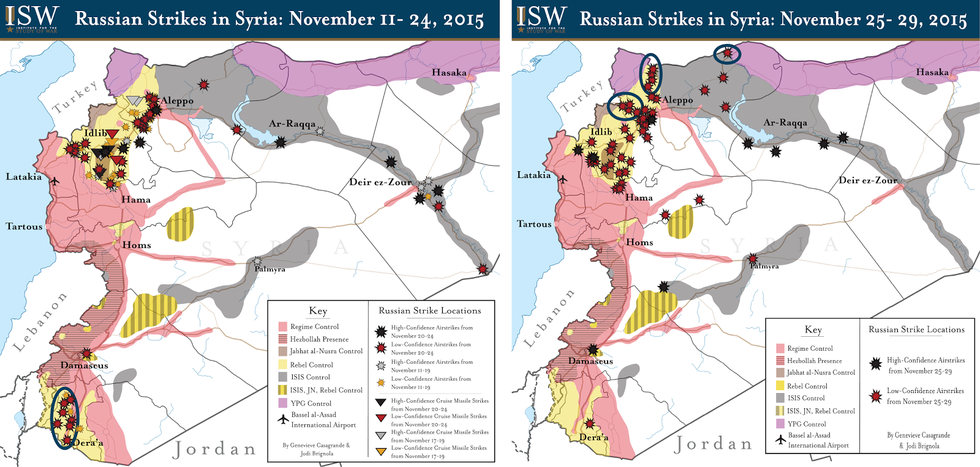After five years of a civil war that has led to more than 250,000 deaths and the displacement of 11,000,000 people, a political solution has yet to be reached. Initially, there was hope that the latest peace talks in Geneva would finally yield a political solution to this conflict. However as of Wednesday the talks have come to screeching halt when Syrian troops captured the towns of Nubul and al-Zahraa in North-Western Syria. Strategically speaking, the capture of these two cities brings the regime several steps closer to capturing the rest of Aleppo and cutting off the rebel supply lines that run into Turkey. The U.N. envoy has placed a three-week hiatus on the talks in order to send the message that negotiations will only continue when both sides are fully committed to reaching a political solution. It is important to note that these recent victories for the regime could never have been scored without the Russian intervention that came in the form of airstrikes.
The word "intervention" has been the name of the game in Syria's civil war, and is a main reason for the war lasting as long as it has. It is imperative that we evaluate this war on not just a micro level but also on a macro level. This war is more than just a confrontation between Assad and rebel factions. It is as much a struggle for influence between Sunni and Shia powers as it is a struggle for influence between the United States and Russia. When the Syrian Civil War erupted out of the 2011 uprisings, the West seized upon the opportunity to dislodge Assad by providing support to moderate rebel groups. In addition to Western support of moderate opposition forces, several other countries (namely Saudi Arabia, Turkey and Qatar) have also supported anti-regime factions. Some of these particular factions are moderate and some of which are not-so moderate. As military clashes escalated, the Assad regime's stability became further jeopardized. This prompted Iran to start providing ever-increasing military support for Assad in terms of weapons, training, military advisors, intelligence and ground troops from Iran's elite Revolutionary Guard. In addition to Iranian assistance, the Iran-backed Shiite militias as well as Hezbollah have provided further support for Assad's battered and war weary army. Iran's support for Assad is based on a shared religious doctrine. It is important to remember that Assad, as well as many high ranking members in the Syrian government and military are Alawites. The Alawites are a minority branch in Shia Islam that is distinct from other main branches in the Shia tradition. Even though Alawites are a different sect of Shiism than the Iranian Twelver sect, there is still a common Shiite foundation that links the two countries who often find themselves at odds with their Sunni rivals (Saudi Arabia, Turkey, and Qatar). Iran has invested so much in Syria because it seeks to preserve the dominant Shia establishment in Syria, which counters the Sunni groups that supported by countries like its arch-rival Saudi Arabia. This support also comes from an Iranian desire to repay Syria for its loyalty during the Iran-Iraq War.
Russia's support of the Assad regime began as a limited involvement that took a drastic escalation in intensity when Assad's government formally asked Russia for military assistance after suffering significant losses earlier that spring. In September 2015, Russia began its now six-month-old bombing campaign under the pretext of fighting ISIL. By intervening in Syria, Russia not only flexes its muscles against Western influence, but also proves to both current and potential allies that Moscow is a loyal and reliable partner. In preserving the Assad regime, Russia also preserves its naval base in Tartus, which functions as the Russian Navy's sole repair and replenishment spot in the Mediterranean. Additionally, Syria (along with Iran) serves as vital ally in the Middle East and an important counter towards U.S. influence in the region which is rooted in countries such as Iraq, Turkey, Israel, Saudi Arabia, Jordan and several other Western-friendly countries. While Russia's campaign has been marketed as an anti-ISIL operation, data shows that U.S.-backed opposition groups have been targeted significantly more than ISIL has.
The map below is from Oct. 29th, 2015. It represents Russian airstrikes with a white (*) and represents known discharges of U.S. TOW antitank missiles with a red dot. The blue territory is in government hands and the gray territory is rebel-held.
Here, we can observe a correlation between where the U.S.-made antitank missiles have been fired and where Russian airstrikes have landed in north-western Syria. This data provides concrete evidence towards the Syrian Civil War becoming increasingly more proxy in nature.
Below is another map showing the concentration of Russian airstrikes in Syria in the month of November 2015.
This map taken from the Institute of War displays Russian airstrikes and shows that they are most concentrated in Western Syria where the opposition groups are, rather than in ISIL-held Eastern Syria. For Russia, the air campaign is a low-cost high-payoff venture and has worked out splendidly for both Putin and Assad. These airstrikes coupled with ground support from Iran, Hezbollah and Shiite militias have given Assad a much stronger hand in the Geneva II peace talks. The most recent victories in Nubul and al-Zahraa testify to the success of Russo-Iranian intervention, and might very well result in regime recapturing all of Aleppo, which is Syria's largest city. If Aleppo were to fall, the Syrian Arab Republic would not only benefit from a morale boost, but would also have an even stronger vantage point from which to negotiate with a much more humbled opposition. How the U.S. and its allies will respond to these victories without directly confronting either Russia or Assad is uncertain, but tensions continue to rise exponentially between the Russian and American coalitions.
It is quite apparent that the Syrian Civil War is becoming progressively more proxy in nature. There are two wars being fought: the proxy war on the ground and the game of chess being played by the great powers. The proxy war is that of Assad versus the rebels, while the game of chess is being played between Russia and Iran on one end of the board and the U.S. and it's Middle Eastern allies at the other. Each side vies for influence in Syria's future direction, and each is willing to invest millions in the war to see their foreign policy goals realized.


























